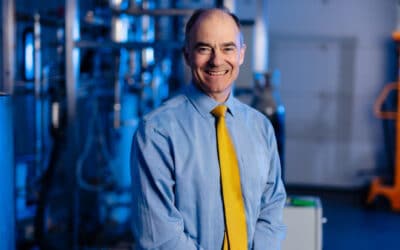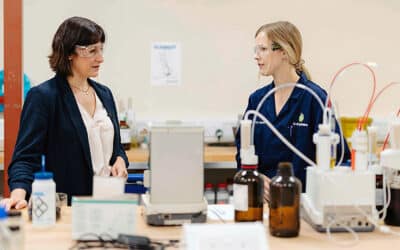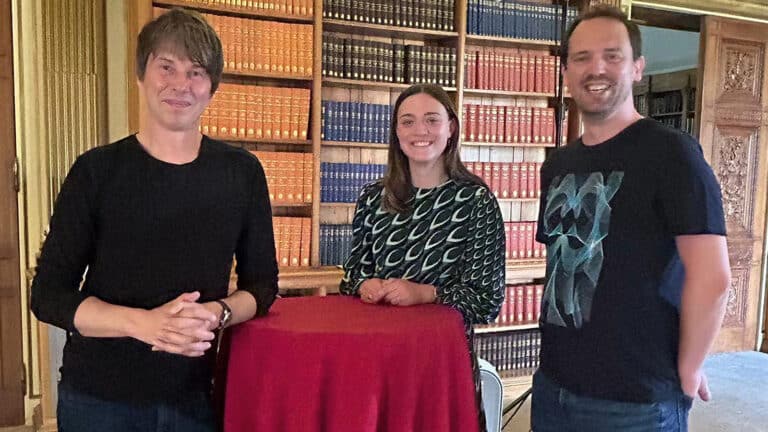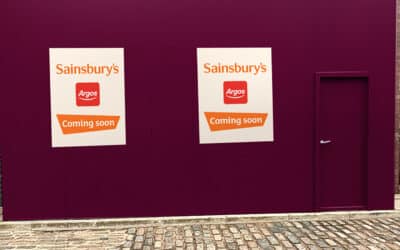Leeds-based C-Capture, a developer of next generation carbon capture technology, is starring in a national series of films created by the Royal Society with Professor Brian Cox, released today.
Members of the C-Capture team and the company’s decarbonisation technology are included within the new series of Brian Cox School Experiments, which engages students with experimental science. Helping teachers bring creative, practical science to the classroom, the films equip students with skills and information on emerging jobs and industries being reshaped by scientific advances.
Aimed at students aged 11-14, the resources span topics at the forefront of global scientific research. C-Capture is included as part of an episode exploring ocean acidification and how it can be tackled, with a focus on carbon capture and storage. In the film, C-Capture’s Dr Douglas Barnes and Rose McCarthy outline the role the company’s proprietary technology can play in mitigating the impacts of climate change as it removes carbon dioxide from industrial emissions before they are released into the atmosphere.
Based on fundamentally different chemistry to current commercially available approaches, C-Capture’s technology does not rely on the use of amines offering a safer, lower-cost solution. It is also robust enough for use within difficult-to-decarbonise industries such as energy from waste and cement and glass manufacturing – which are also some of the biggest emitters of carbon dioxide globally.
Dr Douglas Barnes, research and development manager, C-Capture, said: “C-Capture being invited to be part of this kind of outreach work is a real privilege. It’s an indication of the size of the impact start-up clean tech companies can have in encouraging young people to consider the opportunities available to them in green careers – and how they can utilise their skills to help build a more sustainable future. It’s a testament to the hard work of the whole team, and I’m looking forward to watching the complete series.”
Professor Brian Cox, Royal Society Professor for Public Engagement in Science, added: “The next generation of scientists will lead the way on finding new ways to tackle climate change, improve food security, and shape the evolution of artificial intelligence as it transforms society. I hope these videos will be an invaluable tool for teachers, embedding experimental inquiry into lessons in the context of some of the most critical issues of our time and introducing students to some of the groundbreaking technologies being designed to solve them.”
Other topics in the series include genome editing for sustainable crop production and machine learning and its use in cybersecurity. Each topic is split into three videos. In the first, Professor Brian Cox and a teacher will set up and teach students with a simple classroom experiment. The videos then explore how the science is developing and being used in academia and industry. Interviews with scientists working on these pioneering technologies give students an insight into the career opportunities that may be available to them in the future.
Rose McCarthy, a Senior Chemist at C-Capture, is an advocate of encouraging students to consider futures working in STEM following the challenges she experienced in realising how she could turn her interest and talent in science into a career when she at was at school. In her interview with Cox for the film, Rose discusses her work at C-Capture and how she uses her skills to make a positive impact on the world.
She said: “It’s really exciting to have the opportunity to be a part of the series, and to work alongside someone as influential in science communication as Professor Brian Cox. I hope that we can bring the subject of carbon capture to life and inspire some of the younger generation to pursue a career in science and technology.”
Downloadable resources for the three topics are available from today (Monday, January 29) on the Royal Society’s website and YouTube channel, the STEM learning UK resource library, and the Times Education Supplement (TES) resources pages. A further three topics will be available later in the year and will introduce students to green energy technologies; robotics, and plastics.









